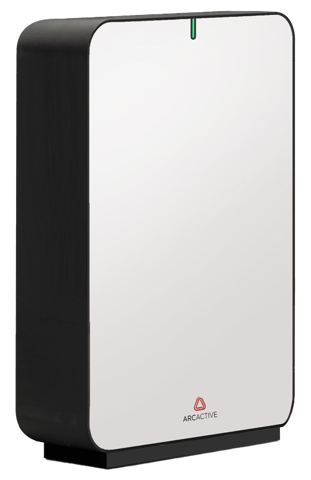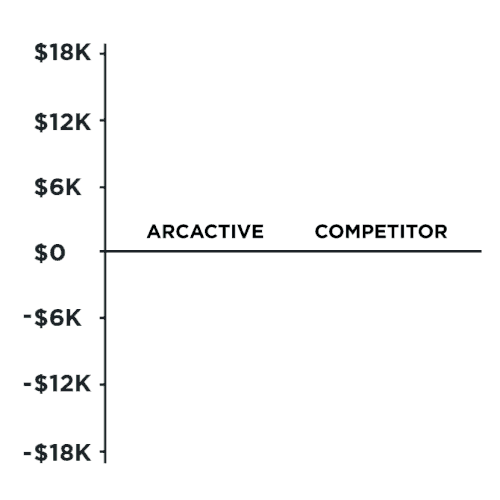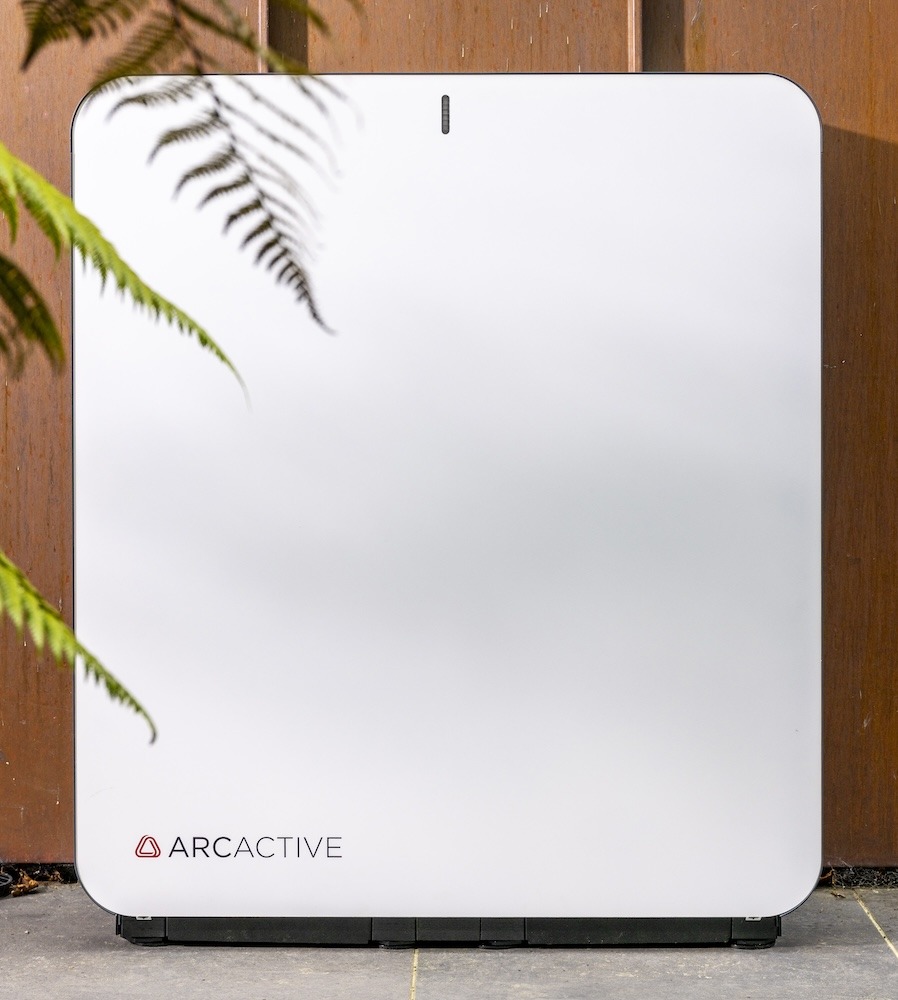ArcActive EnergyBank.
Low-cost, long-life solar storage.
Powered by an array of our innovative ArcStore bipolar batteries, the EnergyBank is currently in development. It is expected to provide a fully usable 15 kWH of energy storage, lasting over 4,000 cycles. Made from infinitely recyclable and sustainably sourced materials, our batteries offer a safe, secure and eco-friendly storage option.
ArcActive is currently in the process of raising capital to build our ArcStore manufacturing facility. Pilot systems are scheduled for deployment in 2025 and full commercial production is anticipated to begin in 2027.


Payback Time
A typical household can save around $1,000 each year by having a battery to store solar energy. However, the problem with current battery storage solutions is the high upfront cost, meaning it can take 18-20 years to break even. Much of the high cost of current battery energy storage comes from a reliance on rare and hazardous materials such as lithium and cobalt.
ArcActive is addressing this challenge. By using widely available, trusted materials, EnergyBank is designed to offer a lower-cost alternative with the potential for financial payback in as little as four years.

We are now seeking strategic partnerships with investors and manufacturers to accelerate our next phase of growth.

Fabric Structured Bipolar Batteries. A new frontier in lead acid battery technology.
Fabric structured bipolar batteries are one of the biggest leaps forward in lead acid battery engineering in over 140 years. By reinventing the traditional “grid + paste” design, our batteries overcome the lifetime limitations that have long-hindered LABs.
Our fabric structured electrodes reinforce the fine particles in the electrode within a composite structure. These innovative electrodes allow for larger pores and a fabric reinforced “active material” particle network, lengthening a lead acid battery’s lifespan by up to ten times.

A Circular approach to
the Planet.
Since ArcStore batteries are based on lead acid battery technology, they have a tiny environmental footprint.
Lead-acid batteries are the most environmentally friendly option for powering battery energy storage. Unlike lithium, no-one goes digging for lead: it‘s simply a by-product of zinc and copper mining. Furthermore, the majority of new lead used today comes from secondary, recycled sources. A consumer can even get paid when they hand over a lead-acid battery for recycling, which underpins the 99% recycling rate for lead-acid batteries.
In it for the Long Haul.
We’ve reinvented the traditional lead acid battery by re-engineering the electrodes to overcome the lifetime limitations that have long-hindered lead-acid batteries. ArcActive’s fabric structured electrodes help delay key failure modes, enabling the batteries to achieve 2000+ cycles at 100% depth of discharge.
Safety First.
Lead-acid batteries are among the safest options for electricity storage. While lead oxide powder is a toxic material - and we take great care to eliminate risks to battery manufacturing workers - LABs present zero risk to the consumer once they have been manufactured.


Reducing emissions
through fuel efficiency.
The automotive industry accounts for 14% of annual global CO₂ emissions, so reducing emissions through fuel economy improvements is a key part of the global drive towards decarbonisation.
While mass adoption of EV’s will eventually reduce CO₂ emissions, improving fuel efficiency of the Internal Combustion Engine (ICE) will have a bigger impact on reducing oil consumption (and therefore CO₂ emissions) in the next few decades. Our proprietary fabric structured electrode technology dramatically improves lead acid batteries' Dynamic Charge Acceptance (DCA), enhancing an existing, low-cost technology and extending its utility for years to come.
Small changes for big rewards.
When braking, a micro hybrid vehicle using an ArcActive battery recovers approximately three times more kinetic energy than a conventional lead acid battery.
The recovered energy can be used to power other electrical functions within the car. The result? Longer and more frequent periods of “no-alternator” operation, so less fuel is required. By improving dynamic charge acceptance in the lead acid battery, fabric structured electrodes can reduce CO₂ emissions by around 3% per vehicle and at minimal additional cost to the manufacturer or the consumer.
That might not sound like much but it’s the equivalent of taking two million cars off the road every year.
3x ENERGY RECOVERED BRAKING
2 MILLION CARS OFF
THE ROAD
3% REDUCTION
PER VEHICLE
Start your engines. Again and again.
Fabric structured electrodes improve fuel economy in micro-hybrid vehicles by optimising battery usage during start/stop events. When a micro-hybrid vehicle is at rest, the engine is switched off, then it restarts again when needed. This presents several challenges for the battery.
Firstly, the battery may endure 10-100x as many starts per day than a traditional car. Secondly, the battery needs to support "hotel loads" (such as lighting and radio) while the engine is off. As a result, it’s relatively easy for a car battery's state of charge to become so low that the car may not restart after a start/stop event. If the battery state of charge drops, the start/stop function is turned off by the car, hence the fuel saving benefits dry up. Having high dynamic charge acceptance means that the system is saving the maximum amount of fuel.
Simply put, our fabric structured electrode technology maximises the fuel saving of a micro hybrid by recovering more of the energy available from the alternator.

Fabric structured electrodes mitigate a common problem with EV auxiliary batteries.
Fabric structured electrodes can also be used for the Auxiliary Battery in EV’s. All EV vehicles have an auxiliary 12-volt lead acid battery as a safety requirement in case the main lithium-ion battery fails.
An Undercharged Unit.
Using fabric structured electrodes as the auxiliary battery in an electric vehicle dramatically improves the functionality of the vehicle by offering constant readiness as it is continuously charged.
During colder periods, regular lead-acid auxiliary batteries can become undercharged. This can lead to a vehicle being unfit, unsafe and, in some cases, unable to function.
Fabric structured electrodes mitigate this issue due to higher charge acceptance at low temperatures. This allows vehicle manufacturers to stop using oversized batteries as a solution to the problem.
Arc of innovation.
In the 1970s, former ArcActive CTO, Professor John Abrahamson was the first person to find and characterise carbon nanotubes. Carbon nanotubes exhibit remarkable electrical conductivity, and have exceptional tensile strength and thermal conductivity.
In 2007, John joined forces with ArcActive CEO Stuart McKenzie, and ArcActive was founded with the goal of developing a continuous process for arc-treating carbon fibre. The resulting technology has been leveraged by the ArcActive team to improve the charge acceptance and longevity of lead acid batteries, finally unleashing the full capability of this ubiquitous technology.
In 2024, ArcActive continued its innovation by partnering with Hollingsworth & Vose to develop a new and improved Glass Electrode Material (GEM). This material incorporates all the benefits of fabric-structured electrodes, while simultaneously reducing costs and has a stable, reliable supply chain from a company deeply engaged with the battery industry.
“Lead [acid] batteries are by far the most important market, with greater than 70% market share of the rechargeable battery market."
Christophe Pillot, Avicenne Energy, 2020
Our Mission.
We strive to create low-cost decarbonisation through innovation.
That’s our ‘why’. It’s what gets us out of bed every morning, and it’s what drives our company forward each day. For almost 15 years, we’ve been re-engineering the lead acid battery industry.
Improving battery technology is a huge opportunity to reduce CO2 emissions, whether by enabling the electrification of vehicles or supporting the growing use of renewable energy.
We keep our environmental impact low.
While lithium-ion batteries are an important technology, lead-acid batteries have been widely deployed for well over 100 years, and the LAB industry shows no signs of slowing down. In fact, the lead acid battery is the most recycled consumer product in history.
Enough lead has already been extracted from the ground to ensure a constant supply of lead acid batteries. That’s why we believe that the quickest way to drive low-cost decarbonisation at scale is by re-engineering the lead acid battery industry.
Management Team.
Stuart McKenzie
CEO & Managing Director
Prior to ArcActive, Stuart spent ten years as a partner at two venture capital companies, with a focus on investing in tech businesses. He received an MBA from Otago University in 2000.
Shane Christie
Chief Technology Officer
Shane graduated with a BEng (Hons) from the University of Canterbury as a Chemical Engineer and has been with ArcActive since the company made its first electrode.
Aimee Pavitt
Operations Director
Aimee has worked with ArcActive for over a decade and has developed strong skills in team leadership and strategic planning. She holds a Bachelor of Applied Science from the Christchurch Polytechnic Institute of Technology.
Kirk McKay
Finance Manager
Kirk is an experienced finance professional with a strong background in financial management, business strategy, and governance. He holds an MBA from the University of Otago and has played a key role in managing both businesses and charitable organisations throughout his career.
Richard Trudgian
Engineering Manager
Richard brings over 30 years of experience in mechanical design, engineering management, and quality management. He holds a Bachelor's degree in Mechanical Engineering from the University of Queensland and a Graduate Diploma in Aerospace Engineering from the Royal Melbourne Institute of Technology.
Board of Directors.
Bruce Munro
Director & Board Chairman
Bruce is one of New Zealand’s most experienced directors. He is currently Deputy Chairman of the Board at Gallagher Group Limited and a former director at the NZ Wool Board.
Mike Chisholm
Director & Board Member
Mike has founded, led and sold two highly successful SaaS businesses and director of several technology businesses and the founder of the EduTech Nepal Foundation.
Steve Tucker
Director & Board Member
Steve has a background in financial accounting, management accounting and financial strategy. He currently serves as Executive Chairman at Gallagher Group Limited.
Brendan McNeill
Director & Board Member
Over a forty-year career, Brendan has held various management positions with high-profile ICT businesses. He was the founding CEO and former chairman of the Digiweb Group of companies.
Phil Lennon
Director & Board Member
Phil was the founder and former General Manager of Apex Rental Cars, which he sold to Avis Budget Group. Phil previously held electronic engineering positions with Telecom.















